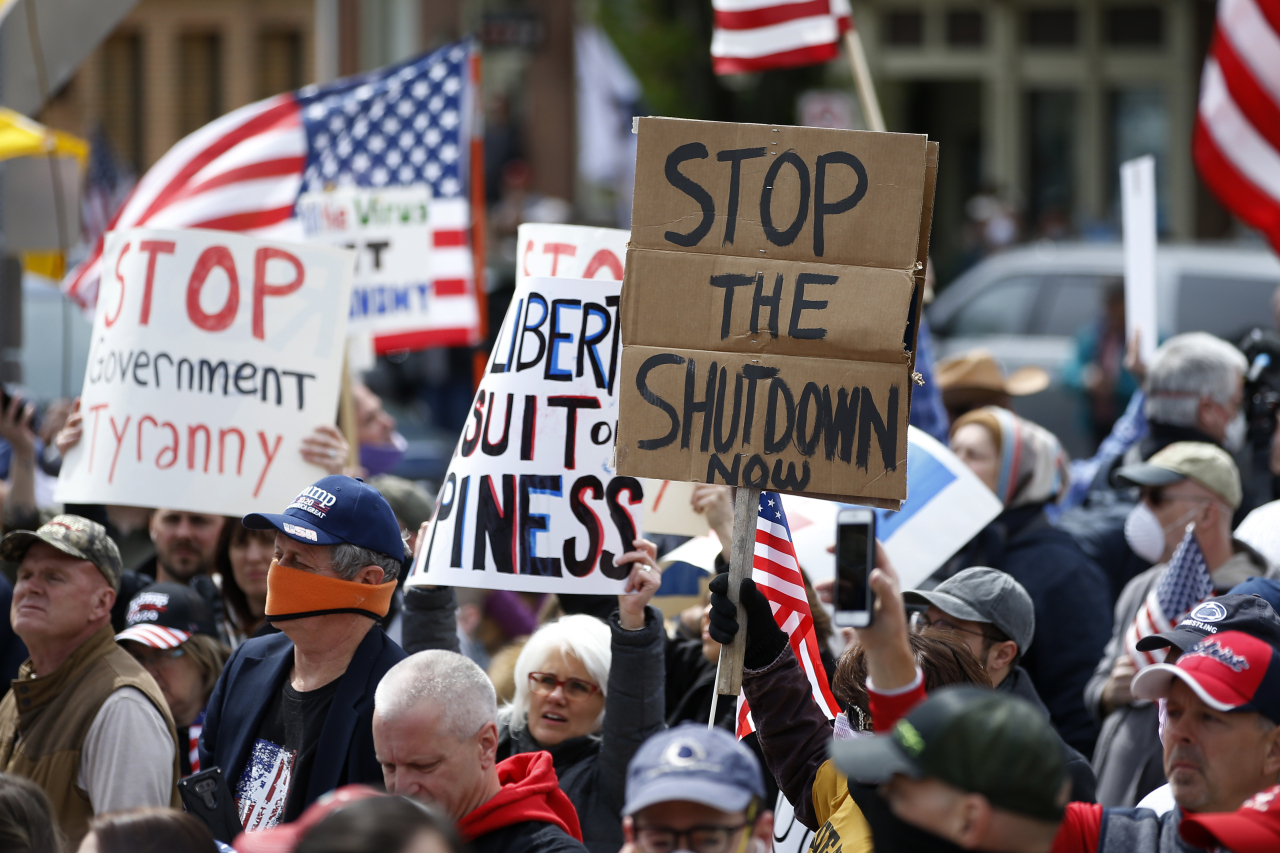 |
(AP-Yonhap) |
WASHINGTON (AFP) -- Donald Trump said he would temporarily ban immigration to the United States because of the "Invisible Enemy" of the coronavirus, as angry Americans took to the streets to demand an end to crippling lockdowns.
In just four months, the virus has turned the world upside down, confining half the planet indoors and killing nearly 170,000 on its march through virtually every country.
Drastic measures never before seen in peacetime have shredded the global economy, resulting in the extraordinary spectacle of oil prices turning negative as demand evaporates.
World leaders are agonising over the right moment to loosen restrictions, terrified of a second wave but aware their citizens need to work and live amid growing signs of social tension.
US President Trump, who has encouraged anti-lockdown protests roiling parts of the country, said Monday he would halt immigration -- a theme long popular with his supporters.
"In light of the attack from the Invisible Enemy, as well as the need to protect the jobs of our GREAT American Citizens, I will be signing an Executive Order to temporarily suspend immigration into the United States!" he tweeted.
At least 22 million Americans have lost their jobs since sweeping lockdowns were implemented to slow the spread of the virus, and exasperation was growing in some parts of the country.
Hundreds took part in a "Patriots Rally" in Pennsylvania, one waving a banner proclaiming "Give me liberty or give me death."
Rose Bayer, 50, said it was "crazy" to shut down the world over a disease she said has a recovery rate of about 98 percent.
"People will starve, they'll commit suicide, they'll lose everything over this. The cure -- like Trump said -- the cure cannot be worse than the disease," she said.
While such demos have captured much attention, more than four in five Americans would approve of a national stay-at-home order, according to a recent Quinnipiac poll.
But isolated protests are also springing up elsewhere with hundreds defying social distancing rules in Vladikavkaz, in Russia's Northern Caucasus, to demonstrate against the lockdown and economic hardship.
Sporadic clashes also broke out in a downtrodden northern Paris suburb with protesters launching fireworks at police they accuse of enforcing the restrictions too harshly.
'Like a war situation'
In hard-hit Europe, several countries are cautiously creeping out from confinement measures, buoyed by mounting signs the worst of the virus may be behind them.
Chancellor Angela Merkel warned Germany was "still a long way from being out of the woods," as she allowed smaller shops from florists to fashion stores to reopen.
There were also encouraging signs in other major European countries such as Italy, France and Britain, although authorities warned citizens against letting their guard down.
Ghana became the first African country to lift its coronavirus restrictions, sparking a mixed reaction on streets in Accra teeming with citizens after a three-week lockdown.
"It is a huge reprieve. We have a listening government," hawker Jemima Adwoa Anim told AFP.
"It was like a war situation. We had no money and at the same time couldn't step out to work to earn some cash," she added.
But others were furious the restrictions had been lifted so early.
"This is totally ridiculous. How is it possible?" asked 20-year-old student Francis Collison.
"We just recorded over 1,000 positive cases of COVID-19 and suddenly the president decided to lift the partial lockdown."
'Nobody wants to buy'
The fallout from the coronavirus has sparked fears of a second Great Depression with millions around the world losing their jobs as economies grind to a halt.
A devastating supply glut resulted in oil producers effectively paying others to take crude oil off their hands, as a barrel of US benchmark West Texas Intermediate for May delivery closed at -$37.63.
Futures prices rebounded back above zero in Asian trade Tuesday, but the historic moves sent shockwaves through global markets, sending the Dow Jones Index sharply lower and Asian markets into the red at the opening bell.
"It's a contract for something that nobody wants to buy," said Matt Smith of ClipperData, as oil storage facilities are full and demand has plunged due to fast-shrinking economic activity.
The virus has sent the aviation sector into a tailspin with cash-strapped Virgin Australia announcing Tuesday it had entered voluntary administration -- the largest airline so far to collapse.
But despite the virus, people around the world are finding imaginative ways to pierce the gloom.
Police in Madrid are blaring their car sirens to celebrate birthdays of people stuck in their apartments.
And in Paris, Carla Bianchi, an actress of Italian origin, sings for her neighbours every night from her window, dedicating her songs to caregivers.
"It's true that often Italian songs that are like serenades to be sung below the window work well," she said.
"As time goes by, a small audience is growing. Even on the other side, from afar, so I see my voice travels." (AFP)








![[Today’s K-pop] Blackpink’s Jennie, Lisa invited to Coachella as solo acts](http://res.heraldm.com/phpwas/restmb_idxmake.php?idx=644&simg=/content/image/2024/11/21/20241121050099_0.jpg)